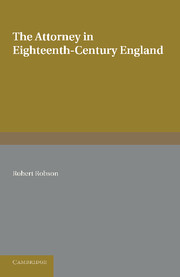Book contents
- Frontmatter
- Dedication
- Contents
- General Editor's Preface
- Preface
- Chapter I Attorneys and Solicitors Before 1700
- Chapter II Regulation of the Profession
- Chapter III The Society of Gentlemen Practisers
- Chapter IV The Provincial Law Societies
- Chapter V The Making of an Attorney
- Chapter VI The Attorney in Local Society
- Chapter VII Estates and Elections
- Chapter VIII Administration and Finance
- Chapter IX Two Attorneys
- Chapter X The Road to Respectability
- Appendix I The Apprenticeships of Richard Carre and Samuel Berridge
- Appendix II The Admission of an Attorney
- Appendix III Christopher Wallis: Notes from the Journal
- Appendix IV A Note on Numbers
- Appendix V The Professions in the Eighteenth Century: a Bibliographical Note
- List of Primary Sources
- Index
Chapter VIII - Administration and Finance
Published online by Cambridge University Press: 05 June 2016
- Frontmatter
- Dedication
- Contents
- General Editor's Preface
- Preface
- Chapter I Attorneys and Solicitors Before 1700
- Chapter II Regulation of the Profession
- Chapter III The Society of Gentlemen Practisers
- Chapter IV The Provincial Law Societies
- Chapter V The Making of an Attorney
- Chapter VI The Attorney in Local Society
- Chapter VII Estates and Elections
- Chapter VIII Administration and Finance
- Chapter IX Two Attorneys
- Chapter X The Road to Respectability
- Appendix I The Apprenticeships of Richard Carre and Samuel Berridge
- Appendix II The Admission of an Attorney
- Appendix III Christopher Wallis: Notes from the Journal
- Appendix IV A Note on Numbers
- Appendix V The Professions in the Eighteenth Century: a Bibliographical Note
- List of Primary Sources
- Index
Summary
IN their concern with estates and elections, the attorneys were only agents, filling—perhaps exploiting—situations which they had not created. The same was true of their work in the administration of local government. Much of the burden of government was placed on the shoulders of lords lieutenant and the justices of the peace in the counties, and of the varied courts and corporations in the towns and boroughs. It was passed on by them to their assistants and subordinate officers, the clerks of the peace, town clerks, clerks to corporations, stewards of manors and the like. It was these posts that were habitually filled by attorneys, and which provided yet another way in which they could enhance their position and add to their influence in eighteenth-century society.
Local government in the period before 1835 was studied by the Webbs, and from their work some idea can be obtained of the part which attorneys played in it. In the first place they held the office of clerk of the peace, or performed its duties as a deputy for some protégé of the lord lieutenant. In Cumberland, for example, in the last decades of the century, the clerk of the peace was J. B. Garforth, Lord Lonsdale's agent and attorney, and one of his members of parliament. Garforth practised in London, lived in Yorkshire, and spent only part of the recess in Cumberland. The routine business of the office was carried on by another attorney, Joseph Hodgson of Carlisle, who had to report regularly to Garforth about county business, and go up to London whenever occasion demanded.
Hodgson was succeeded by his brother William, who became clerk of the peace, the first of his family to hold an office they were to monopolise until the twentieth century. This seems to have been a common situation.
- Type
- Chapter
- Information
- The Attorney in Eighteenth-Century England , pp. 104 - 118Publisher: Cambridge University PressPrint publication year: 2013



